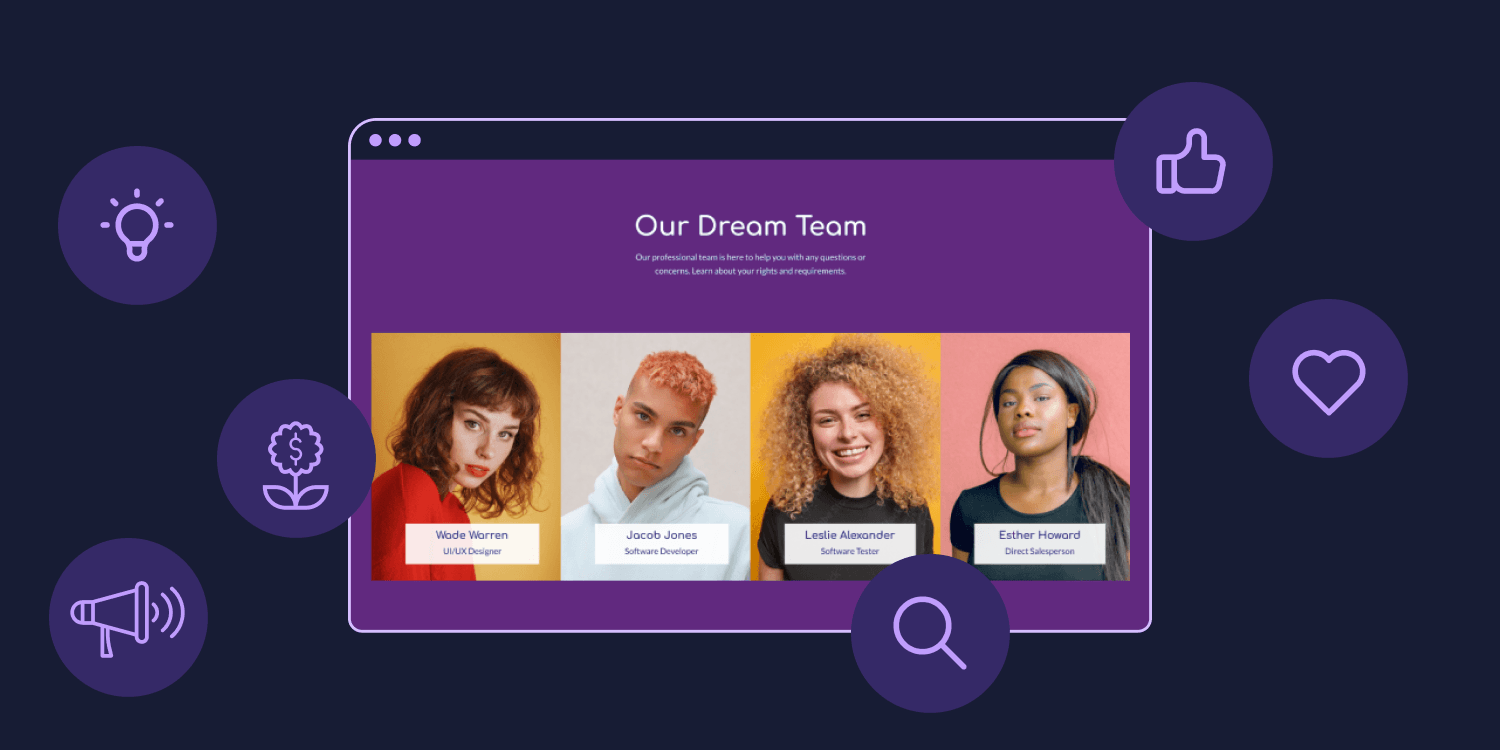Starting an
agency can seem like a daunting task. After all, there’s a lot to take into consideration. From getting potential clients to managing your cash flow, employees, and workflow, being the business owner of a successful agency takes years of experience. But it’s far from impossible if you follow these few steps.
So let’s get into it!
What is an agency?
An agency is a company engaged in doing business for another, usually providing services such as advertising, marketing strategy, web development, web design, search engine optimization (SEO), human resources, and much more. All types of businesses from any industry can take advantage of an agency’s skill set for their own business.
The types of agencies
There are multiple types of agencies, all providing different services to different types of clients. Here are a few of the most common types of agencies.
- Digital marketing agency
- Creative agency
- Advertising agency
- Web development agency
- Content marketing and SEO agency
- Social media marketing agency
- Influencer marketing agency
- Public relations agency
- Full-service agency
- And more.
Each type of agency provides their clients with a unique skill set in a particular industry, but can also grow and add services to become more of a full-service agency providing a broader value proposition to the same target audience. For example online marketing services that could include: SEO, social media management, PPC advertisements, and web design for small businesses.
How to start you own agency?
There’s the juicy part. How do you build your own agency from scratch?
Here are the first steps to get you started:
1. Find your niche
Since there are multiple types of clients, agencies and services, you need to know where you stand. What’s your value proposition? Who’s your target market?
As a new agency, sky’s the limit, but you should always start with just one thing you do well, to later expand.
I would not recommend starting as a full-service agency offering 12 different digital marketing services to any industry and any type of client.
You’ll get lost. Lost in the competitors, lost in your own projects.
And you’ll spread yourself too thin.
Particularly if you’ve been a freelancer before, you can ask yourself; what kind of projects do I like to work on? What kind of clients or industry would I love to work with? What’s my expertise?
This should help you decide.
Don’t forget that you’ll now work full-time on these projects and new clients, so you better like it.
On top of that, focusing on one thing at a time lets you build your expertise and portfolio. Having case studies, testimonials and great projects to show off in a particular niche can really help you get new clients in the industry.
You’ll also be able to know your audience better, understand their needs, and speed up the process when you work for them; like having a few templates for a specific industry ready instead of starting from scratch each time.
2. Decide on your business model
Once you know who you’d like to sell to, you need to figure out how you want to get paid. Here are some popular business models you could use:
- Flat-rate model - The flat-rate business model refers to the model where products or services are offered at a fixed price, regardless of the number of hours the product/service was used and to what extent. The advantage of working with this model is that it’s very simple to set up and you have recurring and predictable revenue every month which helps you with your cash flow. The downside is that some projects or client work may take you more time than expected which means you’d work more for less.
- Flat-rate + commissions
-
It’s not a business model that would work for all agencies, but this can work if you provide services such as paid advertising. You can charge a flat rate (as above) and add a commission based on the results generated. For example, the results generated with a PPC campaign.
- Retainer model
-
A retainer is a pricing model based on the agreement that your clients retain ongoing services from you. The customer agrees to pay in advance for “reserving” your services for set periods of time. With the retainer model you get the stability of the flat rate, but also have more flexibility.
- Hourly rate model
-
Quite self explanatory, the hourly rate model is simply based on a fee per hour of work that you charge your clients. It has the advantage of being flexible depending on the contract you get, but lacks the stability of the flat-rate or retainer models.
According to Sprout social,
88% of agencies say they offer their services on retainer. However, you should decide on your business model depending on your own needs, industry, and objectives.
3. Get clients
Now that you know how you’ll charge for your services, it’s time to
get your first clients! You’re the agency owner of a new business, a startup, this comes with its set of challenges; no one knows you.
Creating a client base can seem very tedious and time-consuming, but it doesn’t have to be.
Here are some tips to keep in mind to get new clients:
- Start by reaching out to your contacts. If you’re a freelancer, you probably have a few past clients that should know about your new business. Otherwise, LinkedIn contacts, businesses you’ve worked for, and even friends and family can also offer some opportunities. Don’t be shy, now’s not the time.
- Start local: It’s always easier to be known locally, in your city, then expand to a larger area. Focus on local newspapers, billboards, podcasts, websites, directories, reach out to local businesses, go to local events, etc.
- Network:
Join associations, groups, forums, communities and make new contacts there.
- Make partnerships: Don’t be afraid to partner up with other businesses, this can help you create a trusting relationship with businesses who will talk about you with their contacts and think about you whenever they need your services.
- Use your own skills as proof: Show don’t tell. You design beautiful websites? Have the most beautiful original website there is. You create fun and efficient Google Ads? Create some for your own agency! You create the best social media strategies? Well, you know what to do! This will help you close new leads a lot more efficiently and prove that you know what you’re talking about.
4. Hire your first employees
The biggest difference between you working as a freelancer and building an agency, is probably the fact that you’ll get to work with a team.
But slow down a minute, are you thinking of hiring a team already?
Of course, if you’ve already got way too many clients and projects going on for one person, you should.
But if you’re just starting, testing the waters, trying to get clients on board, then maybe you’re a step too fast.
Hire only when it becomes necessary.
In the meantime, you can always get some help from freelancers.
You’re ready to hire?
Start by hiring only the core team members you really need to scale. It’s best to hire someone who can help you get projects done first, instead of hiring someone to do project management, or administrative tasks. You should also start by hiring full-stack employees before you hire more niche ones.
3 tips to start you agency smoothly
1. Start small
Start remotely if you can instead of getting an office, scale progressively. There’s no need for a big office space if you don’t have a team yet.
Part of scaling is investing in the right place, and making sure every dollar is spent on getting the next one.
Your agency is barely born, so every dollar counts, now more than ever.
2. Make sure your clients are happy
The best and cheapest marketing there is?
Word of mouth.
In fact,
93% of agencies count on referrals to drive new business. Referrals from current or past clients are crucial to get a business started, so make sure to take advantage.
3. Use the right tools from the get-go
Time is money. So using tools that enable you to save time and work more efficiently can make or break your agency. There are tons of tools you can use:
- Project management tools (Asana, Monday, Trello)
- Financial management tools (Quickbooks, Expensify)
- Digital marketing tools (Ahrefs, Google Ads, SEMrush)
- Marketing Reporting tools (GSC, Databox, DashThis)
- CRM and website building tools (Duda, Wix, Wordpress)
Using tools that are adapted to your needs and help you scale your agency can make a huge difference.
And choosing the right tool from the get-go ensures that you won’t have to manually migrate your projects from one tool to another, so choose carefully.
For website building for example, using a tool that’s built for agencies, like
Duda, enables you to create your websites faster and better, therefore helping you scale your business.
Make sure you use a website builder with features that will help you scale your agency:
- Website templates
- Fully white label platform
- Great SEO & speed performance
- Built-in comments
- Intuitive client management tool
Of course, Duda has all of that and more, so
give it a try to see if it fits your needs.








